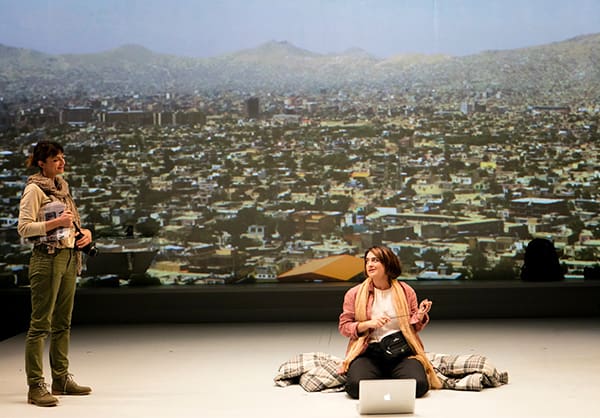Content warning: frequent mentions of war, trauma and post-traumatic stress disorder (PTSD).
Often, a playwright’s first work is a dress rehearsal, lacking in the something they find through practice. The opposite is the case for Walkley-award winning journalist Sally Sara’s Stop Girl. Sara’s intimate lived experience tells the stories of her characters in a way so genuine that their heartache and triumph becomes your own.
Sara spent 2011 reporting for the ABC on the war in Afghanistan, delivering to our childhood television sets the conflict as we understood it. But an untold story of this time, and of journalism generally, is the trauma reporters take on when telling these stories, and which rose to the surface of Sara’s life a few years after coming home.
The PTSD she experienced is the premise of the show. As an audience, we are pulled between sweet moments of laughter and the sound of suicide bombs, in a way that makes each joke create an anxious pit in your stomach for what it might foreshadow. The authenticity of this is a credit to the production team and the videos of Jack Saltmiras. It is often a fine line between a projector adding to the plot and taking away from it, but in Stop Girl the former did not present itself once.
There were moments where characters’ wins felt manufactured in order to keep the audience involved – like a checkbox to make us laugh once every 20 minutes, before throwing us back in the deep end. Throughout the show, however, it became clear that this was an important part of Sara’s representation of PTSD – a perfect way to take us through the rollercoaster of trauma her character was experiencing.
Sheridan Harbridge (Suzie) performed the lead role of this tug-of-war seamlessly. Her character exists in a world separate to those she shares a set with: her body is home in Sydney, but her mind is in Afghanistan – and the characters around her only seem to serve as a reminder of that.
Harbridge is supported by Amber MacMahon (Bec), who acts as a sort of Chelsea-to-Raven side character; the best friend who is there to highlight the extremities of the main character’s emotion. Bec brings forth Suzie’s trauma in the most subtly frustrating and authentic way, representing the kind of feeling you just can’t put words to until someone else does it for you.
The only mild grievance was a subtle feeling of guilt – why is it that we only listen to these stories of war and bloodshed when they are delivered between neat packages of jokes about dogs in Potts Point? Much of the show felt like an inaccessible in-joke; if you didn’t live in Sydney, watch the ABC, know who has won Walkley’s for the past few years and understand the dynamics of Potts Point, much of it would be lost on you. Like a lot of Australian theatre, television and cinema, it begged the question of who we are telling our stories to.
This feeling was exacerbated by the plot-line of Suzie’s mum (Toni Scanlon), who acts as a voice of middle-class reason, reminding Suzie that life is still hard if you’re not in a warzone. However, this issue was simultaneously mended by Atal (Mansoor Noor), whose frequent role of reminding Suzie of her privilege felt like the reminders were just as much for the audience, too.
Despite the bizarre feeling that comes along with hearing stories involving non-white people at the theatre, a place where the audience is almost always jarringly white, Stop Girl was immaculate and heartbreaking and full of love and life and loss; all those things playwrights dream of making an audience feel.
Stop Girl runs until 25 April at Belvoir St Theatre.





